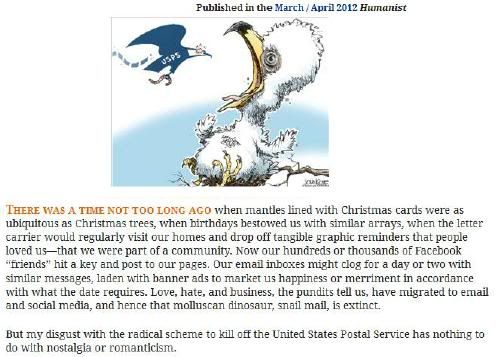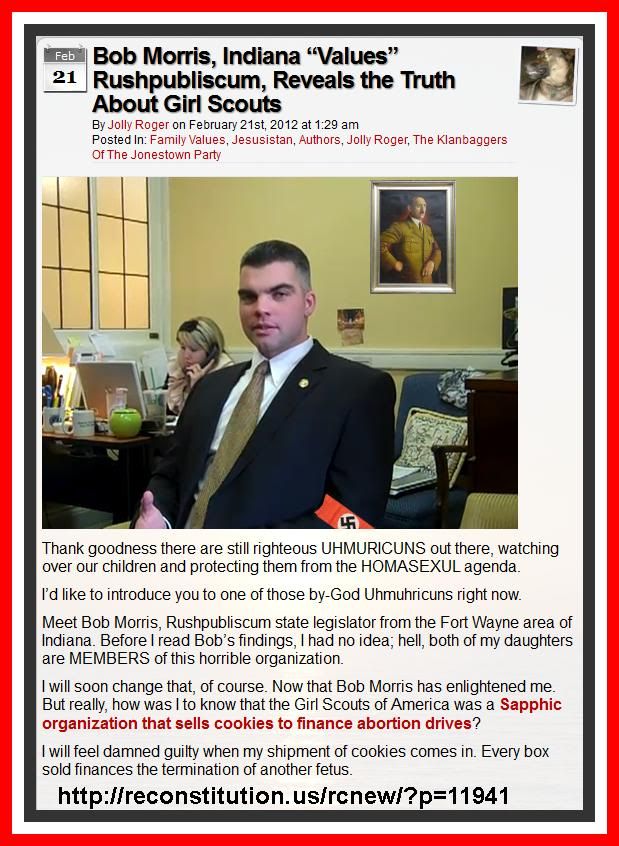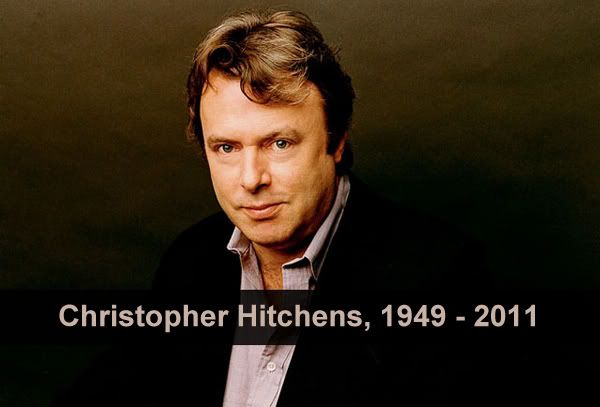Once Upon A Time, Not So Long Ago, The USA Was A Republic
Once Upon A Time, Not So Long Ago, The USA Was A Republic
But Was Dismantled (one service at a time) And Became An Oligarchy
What kind of nation won’t fund a Post Office?
http://thehumanist.org/march-april-2012/going-anti-postal/

{{{EXCERPT}}}The Postal Service is not a mere delivery service, an outdated, inefficient alternative to FedEx or UPS. It’s a public service that every nation on earth, except for Somalia, maintains. In fact the United States joins Somalia as one of the only nations that doesn’t fund a postal system. We used to fund it, from the birth of our nation until Ronald Reagan’s presidency. It’s one of the only public services specifically addressed in the U.S. Constitution—right in Article One. Its genesis dates back to the Second Continental Congress, which appointed Benjamin Franklin as our first postmaster general.
The original purpose of the Postal Service was not to deliver Christmas gifts or iPads but to deliver democracy. It was the conduit for political discussion and debate, tying a geographically dispersed population into a single, somewhat informed electorate. That’s why magazines and newspapers historically enjoyed a low, government-subsidized rate. The Founding Fathers realized that a large nation must communicate through media, and that privately funded media would skew the national debate toward the interests of the rich. Hence, they established the Postal Service and gave it a mandate to subsidize independent media with deeply discounted media mail rates. That’s why its formation was enshrined in the U.S. Constitution—for the same reason the Constitution guarantees freedom of speech and names journalism as the only profession that it specifically safeguards. A free press, including a means for disseminating that press, are paramount necessities for a democracy to function.
Notice how it reads "WE USE TO FUND IT, FROM THE BIRTH OF OUR NATION UNTIL RONALD REAGAN... That says it all, our Republic has been going down, down, down since the Ronald Reagan administration decided that we (our nation) needs to become THE UNITED CORPORATIONS OF AMERICA where all services, from education to prisons to health insurance (bye bye Medicare/caid) and now the Postal Service needs to be privatized (by the 1% few). The Republican party's vision to drown our republic form of government in a bathtub is almost a reality. I hope it's not too late to turn it around... But I can't help feeling like it is... :-( thinkingblue
THE TRUTH: Democracy VS Republic
Is the United States a democracy?
http://thisnation.com/question/011.html
The Pledge of Allegiance includes the phrase: "and to the republic for which it stands." Is the United States of America a republic? I always thought it was a democracy? What's the difference between the two?
The United States is, indeed, a republic, not a democracy. Accurately defined, a democracy is a form of government in which the people decide policy matters directly--through town hall meetings or by voting on ballot initiatives and referendums. A republic, on the other hand, is a system in which the people choose representatives who, in turn, make policy decisions on their behalf. The Framers of the Constitution were altogether fearful of pure democracy. Everything they read and studied taught them that pure democracies "have ever been spectacles of turbulence and contention; have ever been found incompatible with personal security or the rights of property; and have in general been as short in their lives as they have been violent in their deaths" (Federalist No. 10).
By popular usage, however, the word "democracy" come to mean a form of government in which the government derives its power from the people and is accountable to them for the use of that power. In this sense the United States might accurately be called a democracy. However, there are examples of "pure democracy" at work in the United States today that would probably trouble the Framers of the Constitution if they were still alive to see them. Many states allow for policy questions to be decided directly by the people by voting on ballot initiatives or referendums. (Initiatives originate with, or are initiated by, the people while referendums originate with, or are referred to the people by, a state's legislative body.) That the Constitution does not provide for national ballot initiatives or referendums is indicative of the Framers' opposition to such mechanisms. They were not confident that the people had the time, wisdom or level-headedness to make complex decisions, such as those that are often presented on ballots on election day.
Writing of the merits of a republican or representative form of government, James Madison observed that one of the most important differences between a democracy and a republic is "the delegation of the government [in a republic] to a small number of citizens elected by the rest." The primary effect of such a scheme, Madison continued, was to:
. . . refine and enlarge the public views by passing them through the medium of a chosen body of citizens whose wisdom may best discern the true interest of their country and whose patriotism and love of justice will be least likely to sacrifice it to temporary or partial considerations. Under such a regulation it may well happen that the public voice, pronounced by the representatives of the people, will be more consonant to the public good than if pronounced by the people themselves, convened for the same purpose (Federalist No. 10).
Later, Madison elaborated on the importance of "refining and enlarging the public views" through a scheme of representation:
There are particular moments in public affairs when the people, stimulated by some irregular passion, or some illicit advantage, or misled by the artful misrepresentations of interested men, may call for measures which they themselves will afterwards be most ready to lament and condemn. In these critical moments, how salutary will be the interference of some temperate and respectable body of citizens, in order to check the misguided career and to suspend the blow meditated by the people against themselves, until reason, justice and truth can regain their authority over the public mind(Federalist No. 63).
In the strictest sense of the word, the system of government established by the Constitution was never intended to be a "democracy." This is evident not only in the wording of the Pledge of Allegiance but in the Constitution itself which declares that "The United States shall guarantee to every State in this Union a Republican Form of Government" (Article IV, Section 4). Moreover, the scheme of representation and the various mechanisms for selecting representatives established by the Constitution were clearly intended to produce a republic, not a democracy.
To the extent that the United States of America has moved away from its republican roots and become more "democratic," it has strayed from the intentions of the Constitution's authors. Whether or not the trend toward more direct democracy would be smiled upon by the Framers depends on the answer to another question. Are the American people today sufficiently better informed and otherwise equipped to be wise and prudent democratic citizens than were American citizens in the late 1700s? By all accounts, the answer to this second question is an emphatic "no."
Once Upon A Time, Not So Long Ago, The USA Was A Republic
Thinking Outside The GOP "Good Book"
GOP TEA PARTY Now Targeting (demonizing) The Girl Scouts of America
Rational Intelligence Is On Our Side
Without Christopher Hitchens, We (mankind) Are Less.
C-PAC Your White Robes and Pointy Hats Are Showing
RICK SCOTT DRUG TEST POOR PEOPLE UPDATE
The Greatest Generation - Stories
GOP RESPONSE (Ignorance Is Not Bliss) ADDENDUM
ARE THE REPUBLICAN VOTERS WAKING UP?
OCCUPY WALL STREET - AMERICAN AWAKENING
OCCUPY WALL STREET 4TH WEEK UPDATE
OCCUPY WALL STREET WEEK SIX - We Shall Overcome
OWS - POLICE RAID OVER HEALTH CONCERNS
VETERAN'S DAY - A PICTURE THAT SAYS A 1000 WORDS
http://www.thethinkingblue.com
http://thinkingblue.blogspot.com
“Socialism never took root in America because the poor see themselves not as an exploited proletariat but as temporarily embarrassed millionaires.”
- John Steinbeck

 thinkingblue
thinkingblue











